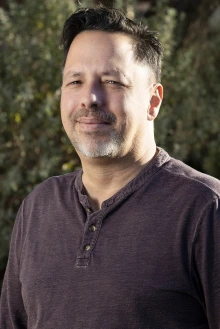Kevin Phillips extends service on NIH addiction panel
Kevin Phillips, a trainer for the Workforce Development Program at the University of Arizona College of Medicine – Tucson’s Department of Family and Community Medicine, will serve on the National Institute of Health’s Helping to End Addiction Long-term Connections Lived Experience Panel for a second year in 2024, continuing on the Hispanic/Latino/a/x/é subpanel.

Kevin Phillips
HEAL Connections is funded by the NIH’s HEAL Initiative, a research effort to “speed scientific solutions to stem the national opioid public health crisis.” The purpose of the panel is to elevate the voices of people who have lived experience with pain, recovery from opioid use disorder or both so that they can effectively speak to the priorities and needs of their communities.
“I’m in a pretty good place in my life right now and I have a lot of privileges that many others in the recovery community do not have,” said Phillips. “Coupled with my position here at UArizona, I thought that it would be a great opportunity to help amplify other voices to where decisions around research funding and processes are being made.
“I hope that out of this panel come new ways to get research results out to underserved communities and maybe more acceptance within the medical, academic and behavioral health communities surrounding peer and family support.”
The Workforce Development Program trains people “who have lived experience with substance use disorder or mental illness on how to transform their knowledge into expertise so they can enter the behavioral health workforce,” Phillips said.
He is an instructor for the Recovery Support Specialist Institute, PeerWORKS and Project FUTRE.
“I also provide continued support for those in our apprenticeship programs. I still remember how difficult it can be at times,” he said.
Rita Romero, a Workforce Development Program training coordinator, is Phillips’ supervisor and was his instructor when he was enrolled in the program.
“Kevin is an invaluable member of our team for many reasons. He provides our trainees with an exemplary model of recovery-oriented practice, inspiring others to open their minds to new ways of helping,” Romero said. “His support has been a crucial factor in our trainees obtaining and sustaining meaningful employment throughout Arizona.
“He is an amazing advocate for the individuals we work with and his commitment to inclusivity, diversity, equity and accessibility is clear in all the work he does with our programs. We are so lucky to have such a talented person on our team.”
Added Phillips: “When I started my own recovery, I was a little lost. I knew that my old career was toxic for me and I had no idea of what else I could do. My past felt like a giant burden that I would have to carry with me into whatever it was I decided to do.
“The idea of being able to use my experience and hardships as a tool to help others was almost too exciting to comprehend. It was like a giant weight had been lifted that had been on me my whole life. When this opportunity came up where I could help others to help others, I jumped at it.”

